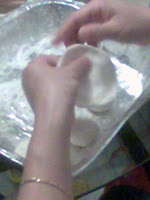The most prominent characteristic of the Chinese version of the holiday is that there is always way too much food. Twenty-two people attend on this day, but surely we have enough food for 40 or more. There's an abundance of dim sum — four or five sets each of shrimp dumplings, shumai, rice noodles, banana-leaf-wrapped sticky rice and more. There is "jook," or congee, and homemade egg rolls and turnip cakes. Boxes overflowing with Chinese pastries — egg custards, sugary breads and roast pork buns. On Thanksgivings past, occasionally some Pizza Hut or Kentucky Fried Chicken would lurk among the Chinese food thanks to certain cousins. But there is none this year.
But there are two turkeys. My aunt cooked two because the supermarket was out of large ones and she insisted one small turkey wasn't enough. It's far from the main star at our table. Not even one of these "small" turkeys gets finished. There are also basic mashed potatoes and an aluminum pan filled with a giant block of stuffing that might have been Stouffer's. This is no sit-down affair. We all crowd around the table, filling our plates as needed and eat standing up, milling about, sitting in folding chairs around the room or downstairs on the living room couch. We return for more at our own leisurely pace. The aroma of roasting meat, the scents of nutmeg and cinnamon — these are absent from our Chinese household.
All this food is the way that my family gives thanks, that we socialize, that we bond. It is loud, always loud. When people speak in Cantonese, it sounds like angry shouting, and somehow in my family, that translates to when English is spoken too. The dog constantly barking at a high volume fits right in. My aunt is our camp counselor, laying out rules about not leaving half-finished drinks everywhere, scampering between the kitchen and dining room, and bossing people around. My dad ribs one of his younger sisters. As the day wears on, my uncles sit in folding chairs in the emptied-out dining room, nodding off. We all constantly graze throughout the afternoon, picking at the various containers filling the dining room table, drinking soda and Chinese tea, and playing Rock Band and the Wii to pass the time.
In the late afternoon, my aunts and grandmother chat in the kitchen while making dough, spooning in a little meat and shaping dumplings. The doughy dumplings sizzle enticingly when they hit the wok. At the sound of it, one of my cousins shouts excitedly, "They're frying!" before turning back to her game. The smell of grease wafts down and we know they're ready, and the game pauses as everyone heads upstairs to snag one or two before they're all gone; somehow we still have a little more room in our full bellies. They're steaming hot and delicious. A second round of frying ensues and another cousin says in wide-eyed wonder, "There's more frying!"
Eventually all the leftover food gets divvied up, with everyone trying to push one more bag of food on another family member. "Take more, take more" is a constant refrain, it seems.
The sun sets and the lights come on, just a few more hours until dinner, but there is never really a break between lunch and dinner. We head out to a nearby Chinese restaurant for a nine-course banquet meal — and that's with a few dishes cut out to pare down from our normal amount because we are not terribly hungry by this point. There are obligatory stories about my dad and his siblings from when they were kids in Hong Kong. They regale my generation with the tale of how my great-grandfather came here around 1926 and had been working on the railroad. And that my family was able to leave China only because he sent $600 "ransom" to the village to get them out. And even then, my dad's two oldest siblings were left behind at first as they traveled to Macao and stayed for six months before arriving in Hong Kong. My grandmother later returned to get them and my great-grandmother. The stories aren't told in a patronizing "give thanks for your good lives" way, but when my family gathers, that sense seems to be inherently present and sometimes they can't help but share these things.
Two apple pies, a cheesecake and some brownies make the trip from the house to the restaurant and help us close out the day alongside traditional Chinese desserts: a sweet soup, some fruit and tasteless nuclear-yellow spongecake. We say our goodbyes hastily but repeatedly, and head home.
Yes, this is my family Thanksgiving.








No comments:
Post a Comment